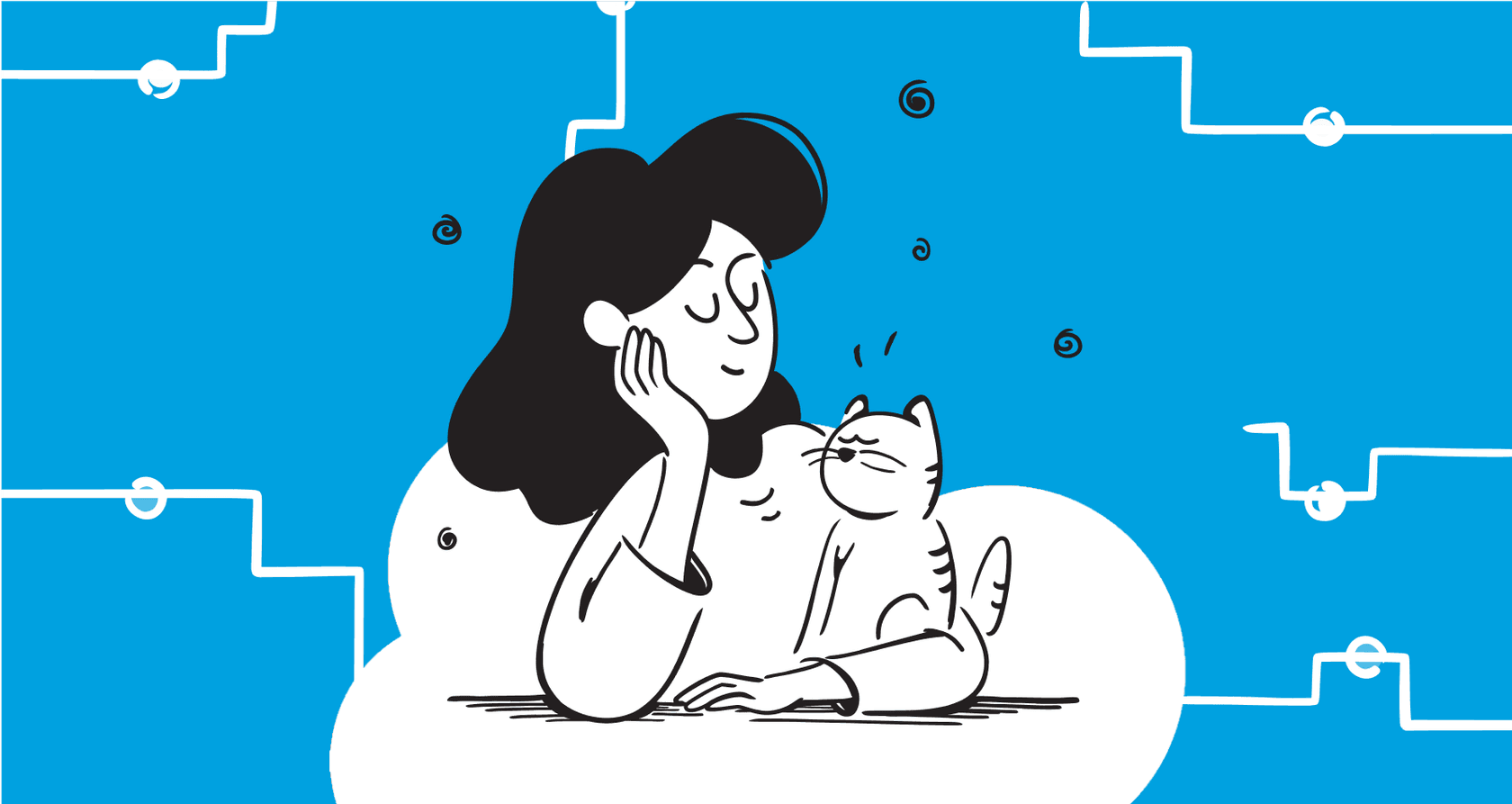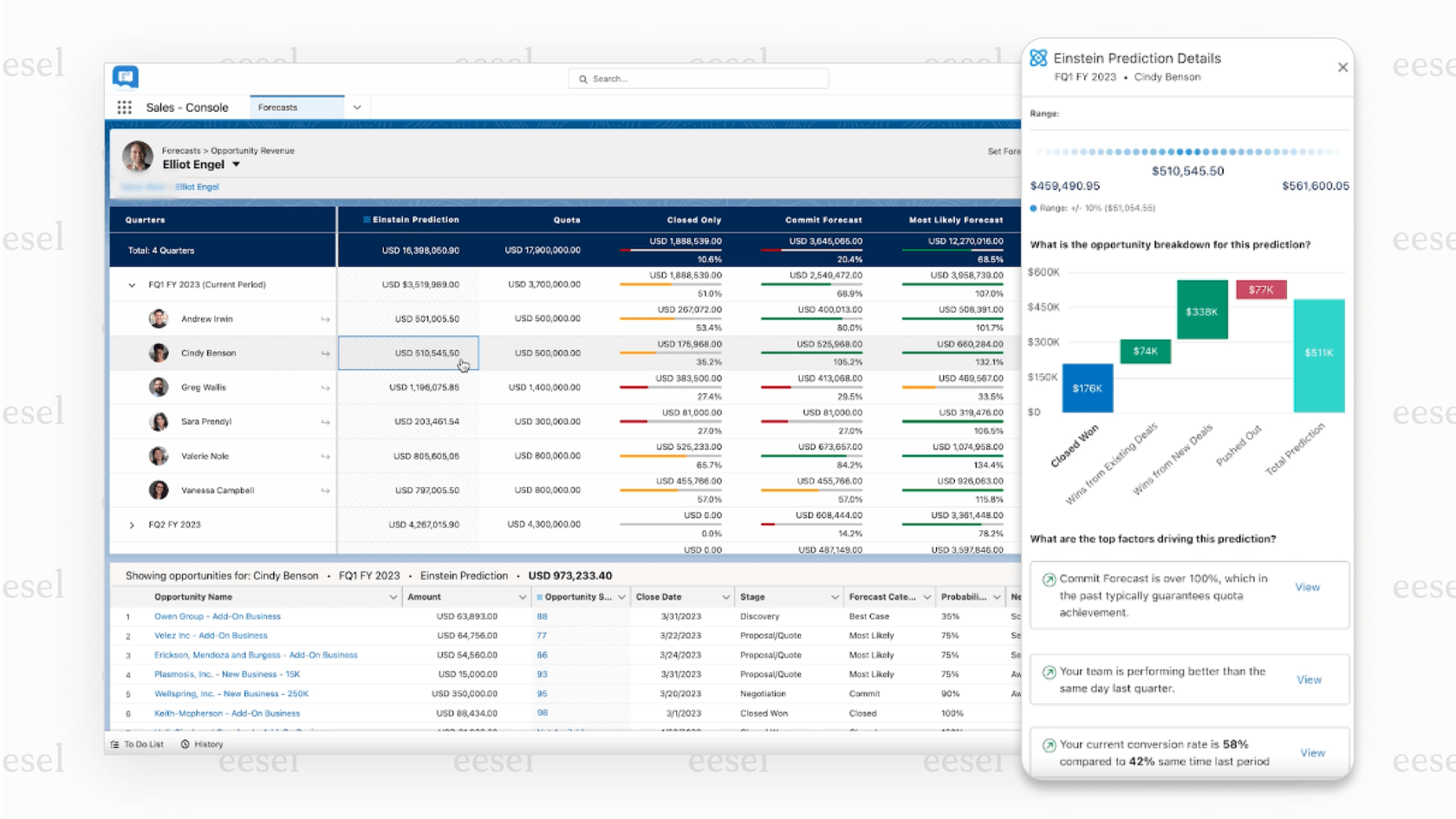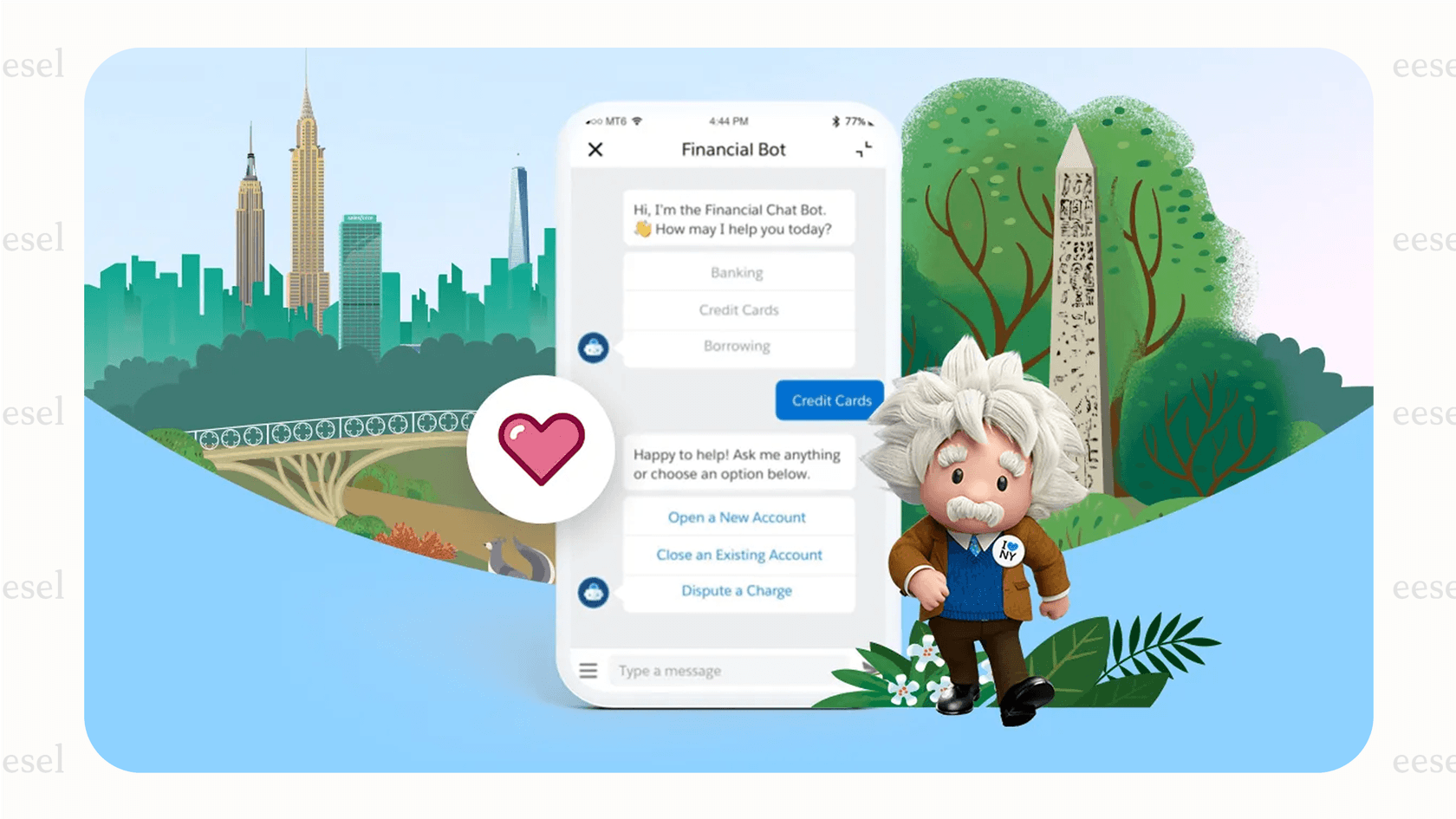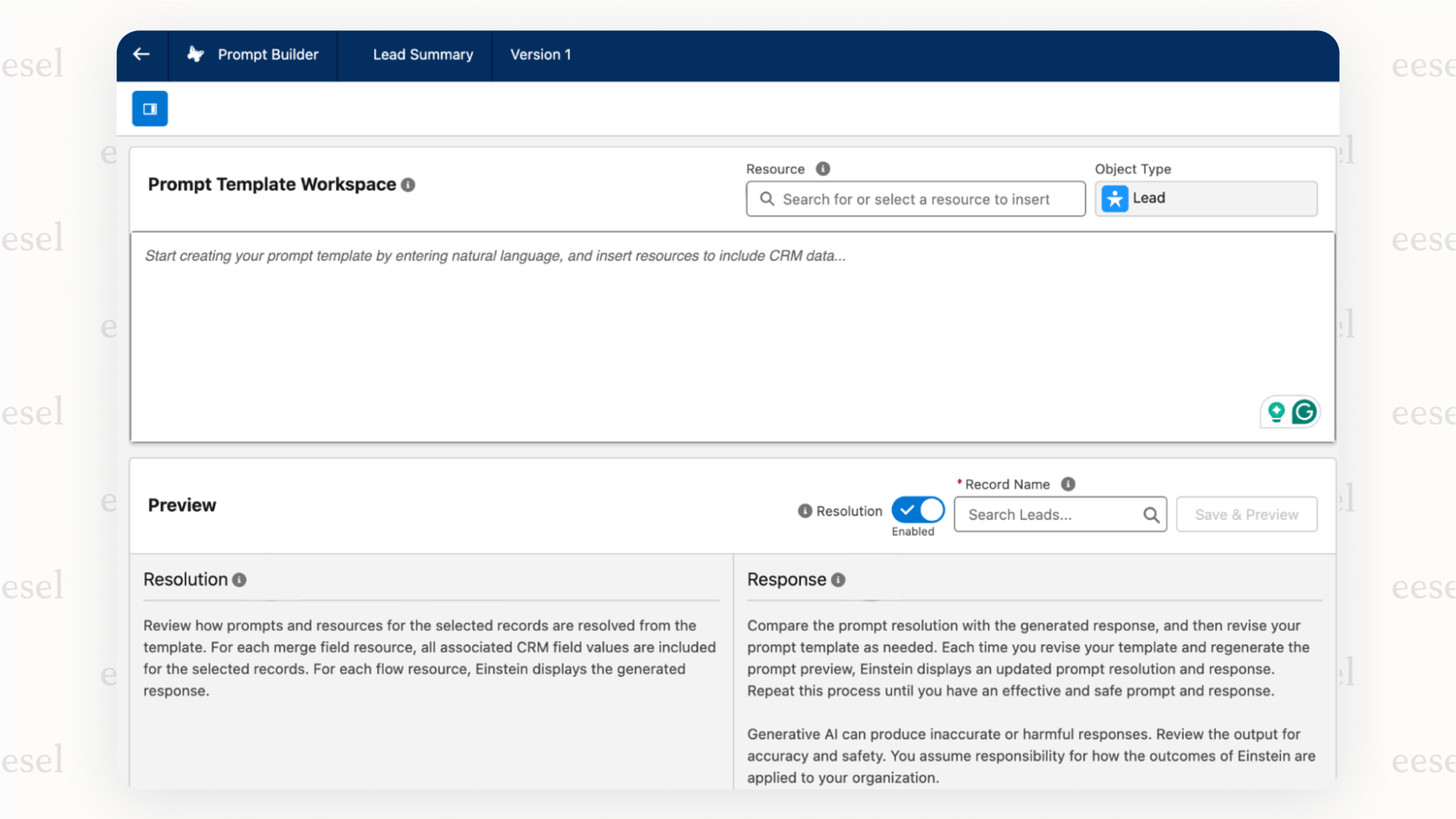
You’ve probably heard the buzz around Salesforce AI. With flashy names like Einstein, Einstein GPT, and now Copilot, the marketing machine is in full swing, promising to completely change how you manage sales and customer service. But if you’re like most people trying to figure this out, you’re likely left with some big questions: What do these tools actually do? And are they really worth the eye-watering price tag?
Spend a few minutes scrolling through Reddit threads on the topic, and you’ll see you’re not alone. There's a running theme that Salesforce AI can feel more like a collection of buzzwords than a practical, day-to-day tool. Many users find it tough to nail down real-world use cases, and the results often don't quite match the slick demos.
This guide is here to give you a clear, no-fluff look at the AI Salesforce uses. We’ll break down what it is, what it isn’t, and uncover the real-world limitations and costs. We’ll also explore why a more flexible AI solution that works with all your company's knowledge might be a much smarter move for your team.
What is Salesforce AI? (Einstein explained)
So, what is Salesforce Einstein? At its core, it isn’t a single product. Think of it as a layer of artificial intelligence that’s built directly into the Salesforce platform. The goal is to make their main products, Sales Cloud, Service Cloud, and so on, smarter and more automated. Recently, they've added Einstein GPT and Einstein Copilot to the family, which bring in generative AI capabilities. This means the platform can now create content, summarize long conversations, and even help developers write code.
Salesforce’s whole strategy is to embed this AI right into the workflows you already use. On paper, that sounds fantastic. Who wouldn’t want their CRM to be smarter?
But here’s the problem with that approach: the AI is effectively trapped inside the Salesforce ecosystem. It can only learn from data that lives and breathes within Salesforce. For the vast majority of companies, that’s a huge problem. Your team's real knowledge, the stuff that solves tricky customer issues, is scattered everywhere, in internal wikis, messy Google Docs, countless Slack channels, and project management tools. This limitation hobbles the AI’s usefulness from day one, because it’s working with only a fraction of the picture.
Salesforce AI features in its core products
Salesforce sprinkles its AI across its different products, with each one promising to streamline specific parts of your business. Let's take a look at what’s on offer and talk about the reality of using these tools day-to-day.
AI for Sales Cloud: The promise of smarter selling
For sales teams, the big pitch for AI is all about helping reps focus their energy on the right leads and close deals more efficiently.
-
What it does: The main features here are Einstein Opportunity & Lead Scoring. These tools dig through your past deals, the wins and the losses, to predict how likely a new lead is to convert or an opportunity is to close. You also get Einstein Forecasting, which uses historical data to project sales figures, giving managers a data-driven peek into the next quarter.
-
The reality: These features live or die by the quality of your data. To get anything close to an accurate prediction, you need years of clean, perfectly structured historical data already sitting inside Salesforce. If your data is a mess (and let's be honest, whose isn't?), the AI’s predictions can be more confusing than helpful. Some users have shared stories of getting laughably generic advice, like being told to "offer a 30% discount" to a hesitant prospect. The truth is, getting real value here means you have to tackle a massive data cleanup project before you can even think about turning the AI on.

AI for Service Cloud: Automating customer support
When it comes to customer service, Salesforce AI is meant to handle common questions automatically and help agents find answers faster.
- What it does: This is where you'll find Einstein Bots, the chatbots designed to handle customer conversations. The platform also has tools for Einstein Case Classification & Routing, which look at incoming support tickets, figure out what they're about, and send them to the right agent or team.

- The limitation: Here’s the catch, and it’s a big one. These tools primarily learn from information stored inside Salesforce, like your official knowledge base articles and past support cases. But think about where the real answers to tough customer problems live. They’re often buried in detailed troubleshooting guides on an external Confluence page, in a shared Google Doc that an engineer put together, or in the back-and-forth of a past Slack conversation. Einstein can’t see any of that. This leaves it stuck, only able to solve the most basic, repetitive questions that have perfectly documented answers.
While Einstein Bots might be fine for answering "What's my order status?", they struggle with anything more complex. For that, you need an AI that can learn from everything. A tool like eesel AI offers a much better approach. It integrates with your help desk but also connects to all the places your company knowledge is scattered. It can pull answers from Confluence, Google Docs, Notion, and Slack, giving it a complete picture to provide genuinely helpful, comprehensive answers.
AI for developers: Building custom intelligence on the platform
For companies with more technical resources, Salesforce offers tools to build your own custom AI features.
- What it does: Tools like Prompt Builder and Model Builder are essentially frameworks that let your developers create unique AI applications that run on the Salesforce platform. You can design custom prompts for specific tasks or even import your own trained AI models.

- The challenge: This level of customization sounds amazing, but it’s not for the faint of heart. It requires a dedicated team of developers, data scientists, and a whole lot of time and budget. It is nowhere near a plug-and-play solution and is simply out of reach for most businesses that don't have an in-house AI engineering department.
If you need custom AI actions without the massive engineering overhead, a self-serve platform is a much more practical option. With eesel AI, you can easily define your AI’s personality, tell it exactly which documents to learn from, and create custom actions through an API, like looking up a customer's order details or updating ticket fields. It’s designed to let you go live in minutes, not months.
The reality of Salesforce AI: Setup, limitations, and costs
Beyond the feature list, there are some very real, practical hurdles that stop many companies from getting the value they were promised from Salesforce AI.
The implementation and data challenge
Salesforce AI isn't something you can just flip a switch on. It demands a huge upfront investment of time and resources just to get your data in order. To even have a chance of working, all your critical information has to be painstakingly migrated and structured within the Salesforce ecosystem.
Without high-quality, centralized data, the AI's predictions are unreliable, and its automations can cause more problems than they solve. For most companies, this turns into a long and expensive implementation project that has to be finished before you can even start experimenting with the AI features.
Key limitations of the Salesforce AI ecosystem
When you put Salesforce's walled-garden approach side-by-side with a more flexible, open AI platform, the differences become stark. A dedicated AI tool that integrates with all your systems just offers more power and a much faster path to seeing results.
| Feature / Limitation | Salesforce AI (Einstein) | eesel AI |
|---|---|---|
| Knowledge Sources | Stuck with data inside Salesforce clouds. | Connects to 100+ sources like Confluence, Google Docs, Notion, and Slack. |
| Setup & Onboarding | Often requires months of setup, data migration, and technical help. | Self-serve setup. You can go live in minutes with one-click integrations. |
| Automation Control | Can be rigid and hard to change. Customizing workflows often requires a developer. | A fully customizable workflow engine gives you total control over how and when the AI automates tickets. |
| Testing & Rollout | Very limited ability to test the AI's performance before it starts talking to customers. | A powerful simulation mode lets you test on thousands of your past tickets to see how it performs before you go live. |
| Pricing Model | Confusing, often requires expensive add-ons and unpredictable credit-based billing. | Transparent and predictable plans. No hidden fees or charges per resolution. |
Salesforce AI pricing: What it really costs
Salesforce's pricing has always been a bit of a maze, and its AI products are no different. Most of these features are not included in the standard licenses and are sold as expensive add-ons.
According to a report from Salesforce Ben, a leading voice in the Salesforce community, the Sales Cloud Einstein and Service Cloud Einstein add-ons typically cost around $50 per user, per month. The newer generative AI features take this a step further by using a credit-based system. This means your bill can swing wildly from one month to the next. Have a busy support month? Your costs could suddenly skyrocket, making it almost impossible to budget accurately.
That kind of unpredictability is a huge problem, especially for growing teams. In contrast, platforms like eesel AI offer clear, feature-based tiers with a set number of interactions. You get predictable, flat-rate pricing, so you're never penalized for having a successful month where you help more customers.
Is Salesforce AI right for your business?
Salesforce AI can definitely be a powerful asset, but it’s really built for a very specific type of company. It's for the massive enterprise that is already all-in on the Salesforce ecosystem, has spent years curating pristine data within the platform, and has the deep pockets and technical teams to handle a long, complicated implementation.
For most businesses, that’s just not reality. Your company's knowledge is likely spread across tools like Google Docs, Confluence, or Slack, and you need a solution that’s easy to manage and won't break the bank. The "walled garden" of Salesforce AI creates massive blind spots, preventing it from having the context it needs to actually solve customer problems or deliver truly sharp insights.
Instead of locking your company into a single vendor's restrictive AI, you might be better off with a dedicated AI layer that connects to all the tools you already use. It gives you more power, more flexibility, and a much faster return on your investment.
Ready to try an AI support agent that learns from your entire knowledge base and can go live in minutes? See how eesel AI can automate your support today.
Frequently asked questions
Salesforce uses a suite of AI technologies collectively known as Einstein, which is embedded directly into its core products. Recently, Einstein GPT and Copilot were added, bringing generative AI capabilities that allow the platform to create content, summarize long conversations, and even assist with code generation.
A significant limitation is that Salesforce AI primarily learns from data exclusively within the Salesforce ecosystem. This "walled garden" approach prevents it from accessing crucial company knowledge stored in external tools like Google Docs, Confluence, or Slack, thereby limiting its ability to provide comprehensive or accurate insights.
For Sales Cloud, Salesforce's AI provides features like Einstein Opportunity & Lead Scoring, which analyze past deals to predict conversion likelihood for new leads. It also offers Einstein Forecasting, which uses historical data to project sales figures, helping managers and reps focus their efforts more effectively.
For Service Cloud, Salesforce's AI includes Einstein Bots, designed to handle initial customer conversations and answer common questions automatically. It also features Einstein Case Classification & Routing, which intelligently analyzes incoming support tickets to categorize them and direct them to the appropriate agent or team.
Implementing Salesforce AI typically demands a huge upfront investment in data cleanup and migration, often stretching over months. Its pricing model includes expensive add-ons and a credit-based system for generative AI, leading to unpredictable monthly costs that can rise significantly during busy periods.
Yes, there are more flexible alternatives, such as eesel AI, that integrate with a much broader array of knowledge sources beyond Salesforce. These platforms can connect to tools like Google Docs, Confluence, Notion, and Slack, providing the AI with a complete picture of your company's knowledge base.
Share this post

Article by
Kenneth Pangan
Writer and marketer for over ten years, Kenneth Pangan splits his time between history, politics, and art with plenty of interruptions from his dogs demanding attention.







